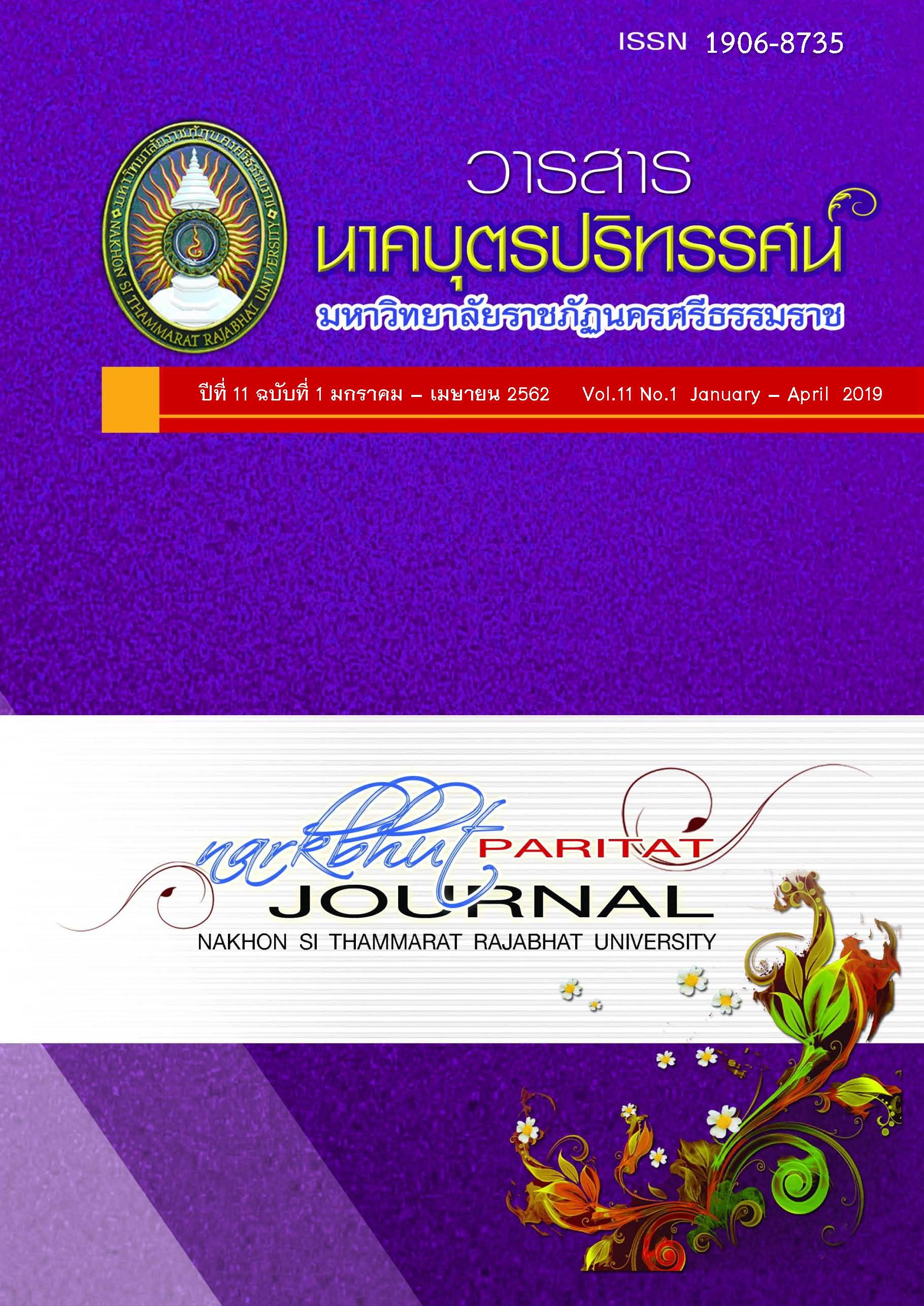การบริหารตามหลักธรรมาภิบาลของผู้บริหารสถานศึกษาสังกัดสำนักงานเขตพื้นที่การศึกษาประถมศึกษากระบี่ Good Governance management of the directors of the office of Krabi Primary Educational Service Area
Main Article Content
Abstract
Abstract
The Objectives of this study are to investigate and to compare the administrative level of good governance under the Office of Krabi Primary Educational Service Area. The sample used in the study were 25 administrators and 316 teacher. The research tools were rating-scale questionnaire with 60 items. The collected data were analyzed by percentage, mean standard deviation t-test and F-test which was used for comparison.
The research findings were as follows:
- Overall, the good governance management of the directors of the office of Krabi Primary Educational Service Area was at the highest level. When considered each aspect, the highest average was cost effectiveness followed by morality, responsibility, accountability, the rules of law, and participation, respectively.
- The good governance management of the directors of the office of Krabi Primary Educational Service Area classified by academic standing was different, Considering each aspect, the results showed that morality, accountability, and cost effectiveness were significantly different at .05 levels. Classified by the school directors’ work experience, it was different from the directors’ good governance management. Considering each aspect, it was found that morality, accountability, responsibility, and cost effectiveness were significantly different at .05 levels. Classified by size of each school, it was not significantly different, both overall and each aspect, at .05 levels.
Article Details
Section
บทความวิจัย
References
References
Bellanca, James I. & Brandt, Ronald S. (2010).21st Century Skills: Rethinking How Students
Learn. Bloomington, IN: Solution Tree Press.
Eakin, Cavolyn Joyce Killman. (1997). Perceptions of principals and Teachers Concerning
Desirable Leadership Traits For Por Princioals in ST. Louis Elemational (ST, Louis, Missouri). Dissertation Abstracts International. 58 (10).
Hoy, Wayne K. and Miskel. (1995). Cecil G. Educational Administration Theory Research and
Practice. Singapore: McGraw-Hill.
Huan Pinthupan. (2010). Introduction to educational administration. [Online] accessible from
http://facstaff.swu.ac.th/huan/. [20 May 60]
Jong Pill, Park. (1997). Creating an Autonomous School Community: school-based
management in Korea. Dissertation. Abstracts. Interational. (March 2000: 378-A).
Krabi Primary Education Area Office Information. (Online). Accessible from:
http://www.krabiedu.net/UserFiles/File/ Information Information 2560 Book (2) .pdf / Search on 10 Jun 6
Neubert, Mitchell John. (1998). A functional-Based Model Informal Leadership Perceptions In
Intact work Teams (team Interaction). Dissertation Abstracts International. 59 (05):1665;
November.
Nicoli, Dante. (2001). The Administrative Behavior of the Superintendent of School as
Perceived by High School Principals. Dissertation Abstract Ross.
Pichitrit Charoon (2011) Research Methodology in Social Sciences, 5th edition, Bangkok,
Chulalongkorn University Publishing
Somsak Supirak. (2007). Development and human resource management. Supporting \ documents School administration Personnel Development Department Office of
Nakhon Sawan Provincial Primary Education.
The Prime Minister. (1999). On the creation of the administration of the country and good
society Retrieved on 10 May 2017. From www.dmr.go.th/download/10.pdf
Tekaa. (1996). A Suggested Model for Community Participation in the Administration of Public
Education in Egypt. Dissertation Abstracts International. 51(10 Mach 1990)3276-A.
Woods. (1998). Kathleen and O’Louglin. “Leadership Factor That influence Educational.
Yoder, Nancy Ann. (1998). Inspired Leadership: Exploring the Spiritual Dimension of
Educational Administration. New York: University of Wisconsin-Madison.
Bellanca, James I. & Brandt, Ronald S. (2010).21st Century Skills: Rethinking How Students
Learn. Bloomington, IN: Solution Tree Press.
Eakin, Cavolyn Joyce Killman. (1997). Perceptions of principals and Teachers Concerning
Desirable Leadership Traits For Por Princioals in ST. Louis Elemational (ST, Louis, Missouri). Dissertation Abstracts International. 58 (10).
Hoy, Wayne K. and Miskel. (1995). Cecil G. Educational Administration Theory Research and
Practice. Singapore: McGraw-Hill.
Huan Pinthupan. (2010). Introduction to educational administration. [Online] accessible from
http://facstaff.swu.ac.th/huan/. [20 May 60]
Jong Pill, Park. (1997). Creating an Autonomous School Community: school-based
management in Korea. Dissertation. Abstracts. Interational. (March 2000: 378-A).
Krabi Primary Education Area Office Information. (Online). Accessible from:
http://www.krabiedu.net/UserFiles/File/ Information Information 2560 Book (2) .pdf / Search on 10 Jun 6
Neubert, Mitchell John. (1998). A functional-Based Model Informal Leadership Perceptions In
Intact work Teams (team Interaction). Dissertation Abstracts International. 59 (05):1665;
November.
Nicoli, Dante. (2001). The Administrative Behavior of the Superintendent of School as
Perceived by High School Principals. Dissertation Abstract Ross.
Pichitrit Charoon (2011) Research Methodology in Social Sciences, 5th edition, Bangkok,
Chulalongkorn University Publishing
Somsak Supirak. (2007). Development and human resource management. Supporting \ documents School administration Personnel Development Department Office of
Nakhon Sawan Provincial Primary Education.
The Prime Minister. (1999). On the creation of the administration of the country and good
society Retrieved on 10 May 2017. From www.dmr.go.th/download/10.pdf
Tekaa. (1996). A Suggested Model for Community Participation in the Administration of Public
Education in Egypt. Dissertation Abstracts International. 51(10 Mach 1990)3276-A.
Woods. (1998). Kathleen and O’Louglin. “Leadership Factor That influence Educational.
Yoder, Nancy Ann. (1998). Inspired Leadership: Exploring the Spiritual Dimension of
Educational Administration. New York: University of Wisconsin-Madison.


